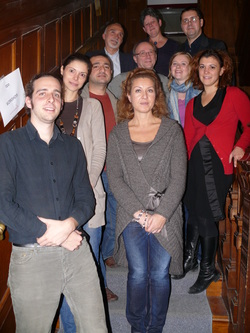Recommendation on Migration in the Learning and Teaching of History
(the recommendation is still in draft form, and subject to change before proposal for endorsement by the EUROCLIO General Assembly in April 2011, Poland)
PREAMBLE
In most European classrooms, migration history is invisible in the learning and teaching of history. The reason behind is that education policies and regulations are commonly decided on by national governments. In history, this results in a focus that is very nationally oriented. Research by EUROCLIO confirms that the national dimension in history education is overrepresented, whereas the regional, European and international dimensions are underrepresented. Yet, many historical events only make sense when they are seen in a larger context. ‘The emergence of nation states’, ‘emancipation of women’, ‘arts’, ‘economic depressions’, ‘famines’ and ‘the Industrial Revolution’ are just some topics that need an international dimension. Also the theme of Migration, a neglected subject in almost all European history curricula, transcends national borders. With this documents history educators from various European Countries present challenges and recommendation on the learning and teaching of migration in history education to pave the way to a more inclusive approach of to this topic.
Teaching Migration in History Education – Challenges and Recommendations
How can migration be integrated into the history school curricula? How should this topic be taught in the (history) class room? What can we learn from past perspectives on migration to create a better future? Addressing these issues, EUROCLIO, EUROPAVM and ISHA implemented the one and a half year long project “Connecting Europe through History – Experiences and Perceptions of Migrations in Europe” offering a series of conferences in various European Members States. The debates during these events created and reinforced connections between academics, teachers, students and parents – a unique blend of Civil Society Organisations - that places the school and education at the centre of society. Participants discussed about ways to overcome cultural differences, taking into account that contemporary societies are increasingly shaped by the movements of people within and between the different national territories.
During this conference series, the actors involved set up an Expert Committee on the Teaching of Migration in History Education. On 20 November 2010 in Vienna, the committee identified the following challenges that history educators face when teaching migration and finalized a set of recommendations on how and where to move forward.
Challenges identified by the Expert Committee:
- Noticing that where migration history is taught:
- The focus is set on negative concepts, for instance wars, persecutions, economic and social deprivation.
- It often entails the distinction between ‘us’ and ‘them’.
- Observing that students and pupils from a migrant background continue to be mainly labelled as immigrants, even when they have been living in the respective national territory for more than one generation.
- Observing that throughout Europe various existing European as well as national recommendations concerning multiperspective approaches, innovative curricula, evaluations and examinations that correspond to the teaching aims have not been implemented;
- Considering that History Education is very much influenced by the dominant political climate, which leaves controversial issues untouched.
- Observing that curricula and textbook designs are often overloaded, prescribed and decided upon from national perspectives,
- Recognizing that many history educators;
- tend to be ‘colour-blind’ in inter-cultural classrooms.
- have difficulties in implementing the necessary approaches of historical thinking.
- History educators, curriculum developers and policy makers consider migration as an intrinsic part of human history and every-day life. To overcome the negative connotation of migration, new narratives that are grounded, clear and inclusive of migrant and non-migrant histories have to be developed and integrated into school curricula.
- The understanding of migration histories is broadened through the inclusion of internal migration and mobility into the discourse about people on the move.
- It is necessary for migrant students to have their own personal histories presented in the classroom, since all students are interested in their own history. An approach like this reflects an inclusive approach of teaching history.
- Policy- and decision makers implement the existing European and National recommendations, to support interdisciplinary approaches in education and to adjust curricula evaluation in accordance with the required changes/recommendations.
- The development of flexible curricula has to be supported, giving history education professionals and practitioners the required pedagogical freedom.
- It is highly necessary to develop pre-service training aimed at the pedagogical content knowledge of teachers to be creative and flexible; which means to have wider approaches of historical subjects: (1) including university courses on world history, (2) allowing for creativity in very national topics through aiming at connecting local, regional, national, European and global levels.
The following organizations and persons form the Expert Committee on the Teaching of Migration in History Education:
Benny Christensen (History Teachers’ Association of Denmark)
Najat Ouakrim (Finnish History Teachers’ Association)
Vajda Barnabas (Hungarian History Teachers’ Association)
Abdulcelil Gök (Turkey Association of History Educators)
Tamara Janković (Croatian History Teachers’ Association)
Elise Storck (Dutch History Educators’ Association - VGN)
Paolo Cecolli (LANDIS – Italian History Teachers’ Association)
EUROCLIO – European Association of History Educators
EVROPAEVM – A Network of Leading Universities
ISHA – International Association of Students of History
